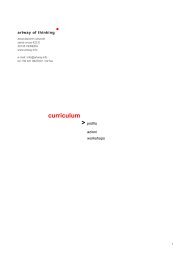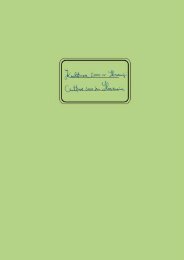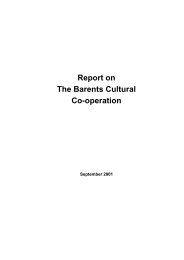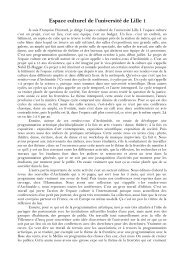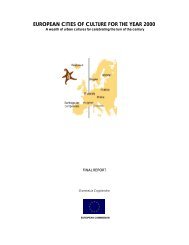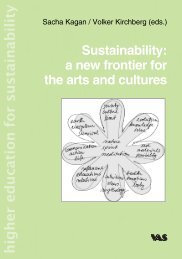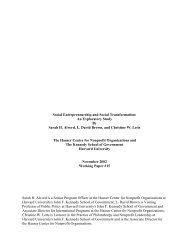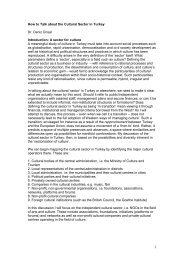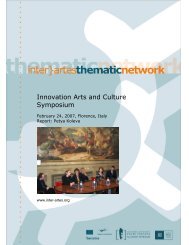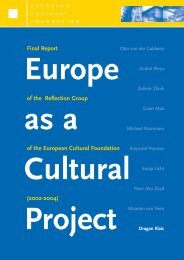A guide to the export and import of cultural goods between Russia ...
A guide to the export and import of cultural goods between Russia ...
A guide to the export and import of cultural goods between Russia ...
You also want an ePaper? Increase the reach of your titles
YUMPU automatically turns print PDFs into web optimized ePapers that Google loves.
<strong>Russia</strong><br />
Сhapter 4: <strong>Russia</strong><br />
The Cultural Objects Export <strong>and</strong> Import Law states that <strong>export</strong> cus<strong>to</strong>ms duties are not<br />
charged on <strong>cultural</strong> <strong>goods</strong> covered by <strong>the</strong> required documents, as specified by <strong>the</strong> Law.<br />
Cultural <strong>goods</strong> carried by <strong>the</strong>ir owners are not regarded, under <strong>the</strong> Law, as part <strong>of</strong> personal<br />
property on which value restrictions are imposed on departure by cus<strong>to</strong>ms regulations.<br />
In <strong>the</strong>ory, <strong>the</strong>re is no distinction <strong>between</strong> cus<strong>to</strong>ms organisations authorised <strong>to</strong> clear <strong>cultural</strong><br />
<strong>goods</strong> <strong>and</strong> those that are not. In practice, however, certain restrictions are placed<br />
on cus<strong>to</strong>ms houses empowered <strong>to</strong> accept cus<strong>to</strong>ms declarations (<strong>to</strong> be filled out for all<br />
<strong>cultural</strong> <strong>goods</strong>) or those that clear precious metals <strong>and</strong> gems.<br />
In case <strong>of</strong> doubt, call <strong>the</strong> Federal Cus<strong>to</strong>ms Service or its regional <strong>of</strong>fi ces (at http://<br />
www.cus<strong>to</strong>ms.ru) <strong>to</strong> obtain fi rst-h<strong>and</strong> information on cus<strong>to</strong>ms organisations authorised<br />
<strong>to</strong> clear a particular object.<br />
What are <strong>the</strong> rules <strong>to</strong> follow when <strong>import</strong>ing <strong>cultural</strong> <strong>goods</strong> <strong>to</strong> <strong>Russia</strong>?<br />
In <strong>the</strong> first place, you should keep in mind <strong>the</strong> difference <strong>between</strong> <strong>import</strong>ing <strong>cultural</strong> <strong>goods</strong><br />
in<strong>to</strong> <strong>Russia</strong> permanently or for a specified period only. The first option does not involve<br />
an obligation for <strong>the</strong> owner <strong>of</strong> <strong>the</strong> <strong>goods</strong> <strong>to</strong> take <strong>the</strong>m back abroad while, in <strong>the</strong> second<br />
option, <strong>the</strong> owner is required <strong>to</strong> pledge <strong>to</strong> take <strong>the</strong>m back home within a specified time<br />
period. A typical example <strong>of</strong> <strong>cultural</strong> <strong>goods</strong> being brought in<strong>to</strong> <strong>Russia</strong> temporarily is an<br />
old master’s musical instrument owned by a member <strong>of</strong> a foreign orchestra on a <strong>to</strong>ur <strong>of</strong><br />
<strong>Russia</strong>, or a painting <strong>import</strong>ed for a short exhibition in a <strong>Russia</strong>n museum.<br />
All <strong>cultural</strong> <strong>goods</strong> <strong>import</strong>ed <strong>to</strong> <strong>Russia</strong> (that is, for permanent <strong>import</strong>) are always cleared<br />
through <strong>the</strong> cus<strong>to</strong>ms <strong>and</strong> entered in a register kept for this purpose under <strong>the</strong> Cultural<br />
Objects Export <strong>and</strong> Import Law. In practical terms, remember <strong>to</strong> declare your object<br />
in writing <strong>and</strong> expect <strong>the</strong> <strong>Russia</strong>n cus<strong>to</strong>ms <strong>to</strong> register it specifi cally as an <strong>import</strong>ed<br />
<strong>cultural</strong> good.<br />
Сultural <strong>goods</strong> <strong>import</strong>ed in<strong>to</strong> <strong>Russia</strong> are registered by a cus<strong>to</strong>ms <strong>of</strong>ficer who puts a stamp<br />
on a Form TD-6 cus<strong>to</strong>ms declaration with <strong>the</strong> text, “Registered on entry <strong>to</strong> <strong>the</strong> <strong>Russia</strong>n<br />
Federation on declaration as a <strong>cultural</strong> good,” with <strong>the</strong> following documents attached:<br />
• Three copies <strong>of</strong> a detailed list <strong>of</strong> <strong>the</strong> <strong>cultural</strong> <strong>goods</strong> brought in, <strong>and</strong><br />
• Three sets <strong>of</strong> pho<strong>to</strong>graphs (at least 8 by 12 cm) <strong>of</strong> <strong>the</strong> <strong>cultural</strong> <strong>goods</strong> carried in<strong>to</strong><br />
<strong>Russia</strong>.<br />
No pho<strong>to</strong>graphs are required for archive documents, printed matter, postage stamps,<br />
coins, paper money <strong>and</strong> decorations.<br />
O<strong>the</strong>r documents <strong>to</strong> be produced <strong>to</strong> <strong>the</strong> cus<strong>to</strong>ms are those certifying <strong>the</strong> origin <strong>and</strong> value<br />
<strong>of</strong> <strong>the</strong> <strong>cultural</strong> <strong>goods</strong> <strong>import</strong>ed in<strong>to</strong> <strong>Russia</strong>.<br />
In determining <strong>the</strong> status <strong>of</strong> a given object as <strong>cultural</strong> good, cus<strong>to</strong>ms <strong>of</strong>ficers are <strong>guide</strong>d<br />
by <strong>the</strong> Cultural Objects List compiled pursuant <strong>to</strong> <strong>Russia</strong>n Federation Law No. 4804-1,<br />
248



